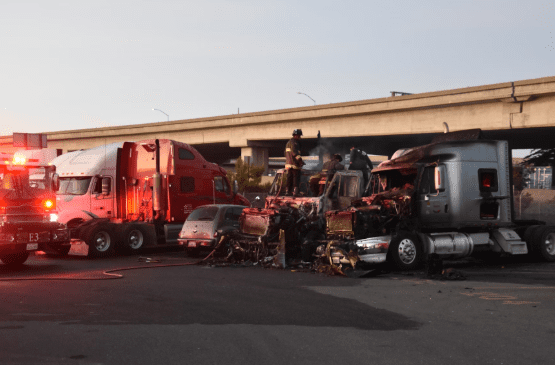
Understanding Relevant Evidence in a Truck Accident Case
When you’re injured in a truck accident, your road to recovery is long while your bills continue to pile up. Personal injury claims can help you recover what you’ve lost—but it all comes down to whether you and your attorney can prove your losses. The quality and quantity of evidence are key, and understanding what can help is your first step toward building a strong claim.
Why Evidence Matters in Truck Accident Cases
Evidence is the foundation of every legal case, including truck accident claims. Evidence proves what happened, identifies who is responsible, and supports your right to recover compensation for your losses. Truck accident claims often involve larger losses, more severe injuries, and multiple parties, which makes strong evidence especially important.
Truck crashes differ from car accidents in several significant ways. Commercial trucks are subject to strict federal safety regulations under Federal Motor Carrier Safety Regulations (FMCSR), which cover everything from driver hours to vehicle maintenance. This means that in addition to the usual accident evidence, like police reports and photos, you may need specific documentation from the trucking company or driver to prove your case. Many of these records are only kept for a limited time before they can be legally destroyed, so quick action is important—and that’s where a skilled personal injury lawyer can be invaluable.
Key Types of Evidence to Collect
While every case is different, there are some key types of evidence that bolster every truck accident claim:
- Police reports and crash scene photos: A police report is an official record of the crash. Scene photos can capture vehicle positions, damage, skid marks, and weather conditions. These details could be lost after cleanup.
- Black box and electronic logging device (ELD) data: Most commercial trucks are equipped with event data recorders, sometimes called “black boxes.” Black boxes capture speed, braking, and other operational data. ELDs track driver hours and rest periods. Violations can show that fatigue may have played a role in the crash.
- Driver logs and employer records: These documents can reveal patterns of overwork, missed rest breaks, or unsafe scheduling. Employer records may also show hiring and training practices, which could support a claim of negligent hiring or supervision.
- Truck maintenance and inspection history: Trucking companies must regularly inspect and maintain their vehicles. Records showing missed inspections or overdue repairs can help establish mechanical failure or negligence.
- Medical bills and treatment documentation: Your medical records connect your injuries to the accident and establish the cost of your care. Documentation from doctors and specialists can also describe your prognosis and long-term treatment needs.
- Cell phone records: Distracted driving is a common factor in crashes. Records can show whether the driver was texting or making calls at the time of the accident.
- Dashcam footage: If available, dashcam video from your vehicle, the truck, and nearby businesses can show how the crash occurred.
Challenges in Preserving and Accessing Evidence
Collecting evidence after a truck accident is not always straightforward. Some types of evidence are time-sensitive and may be altered or destroyed if they’re not preserved in time. For example, trucking companies are only required to keep certain driver logs and inspection records for a few months. Black box data can be overwritten during regular operations.
Trucking companies and their insurers may resist sharing records that could show fault. In some cases, they may begin their own investigation immediately after the crash to protect their interests. This puts you at a disadvantage if you don’t act quickly.
The best way to make sure evidence is preserved is to work with an experienced lawyer. Your attorney can send a spoliation letter to the trucking company, which requires them to preserve all relevant records and data.
Using Evidence to Prove Fault and Negligence
In Georgia, you can recover damages as long as you are less than 50% at fault for the crash, but your compensation will be reduced by your percentage of fault. Strong evidence helps establish that the truck driver or company bears the majority of responsibility.
Black box and ELD data can reveal if the driver was speeding, braking suddenly, or violating hours-of-service limits. For example, if the records show the driver had been behind the wheel longer than allowed, it may support a claim that fatigue contributed to the crash.
In some cases, you’ll need witnesses to prove fault. For example, accident reconstruction specialists can use data, photos, and reports to recreate the sequence of events. Medical experts can explain how the crash caused your injuries and how those injuries impact your life.
How a Truck Accident Lawyer Builds Your Case
An experienced lawyer organizes the evidence, identifies gaps, and connects each piece to the legal standards needed to prove your claim. This process may include:
- Gathering and reviewing all relevant evidence from the scene, medical providers, and the trucking company
- Communicating with insurance adjusters and opposing counsel
- Filing motions to subpoena records or compel data preservation
- Negotiating a settlement that reflects the full value of your claim
The stronger your evidence, the more leverage your lawyer will have during negotiations. If the other side sees that your case is well-documented, they may offer a fair settlement, rather than risk losing even more at trial.
What to Do After a Truck Accident
Your actions immediately after a crash can have a major impact on your case. If you are physically able and it’s safe to do so:
- Get medical help right away, even if you don’t think you’re seriously hurt. Some injuries take time to show up.
- Take photos of the vehicles, the road, and anything else that may be relevant.
- Get contact information for witnesses.
- Request a copy of the police report as soon as it’s available.
- Get an experienced lawyer as soon as possible.
Find Out More from an Experienced Personal Injury Firm
The Scott Pryor Law Group has experience navigating the complex rules and procedures involved in truck accident cases. We’ve recovered millions for accident victims, and we’re ready to help you. Contact us today to discuss your case and take the first step toward pursuing full compensation.
Photo by Bill Aboudi on Unsplash










